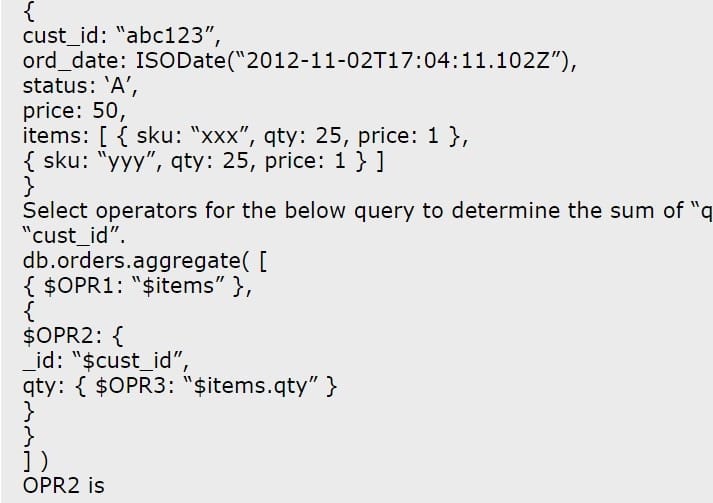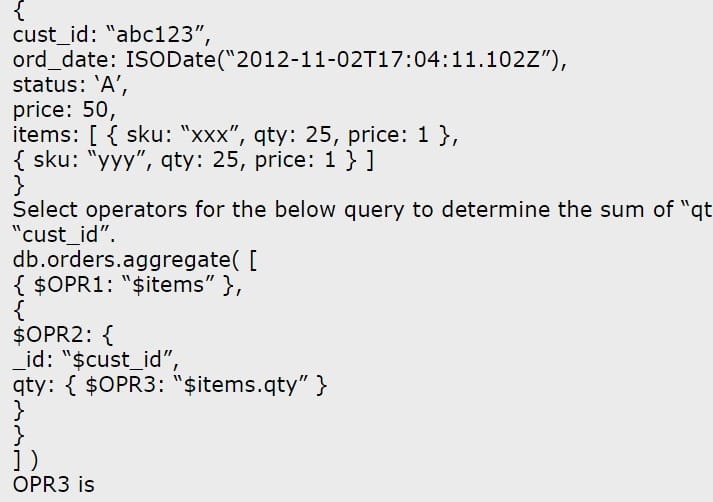Exam Details
Exam Code
:C100DBAExam Name
:MongoDB Certified DBA Associate (Based on MongoDB 4.4)Certification
:MongoDB CertificationsVendor
:MongoDBTotal Questions
:132 Q&AsLast Updated
:Jun 23, 2025
MongoDB MongoDB Certifications C100DBA Questions & Answers
-
Question 11:
What does the output x of the following MongoDB aggregation query result into; db.posts.aggregate ( [ { $group: { _id; "$author", x: { $sum: $likes } } } ] )
A. Average of likes on all the posts of an author, grouped by author
B. Number of posts by an author
C. Sum of likes on all the posts by all the authors
D. Sum of likes on all the posts by an author, grouped by author
-
Question 12:
What does the following aggregate query perform?

A. Fetches the posts with likes between 100 and 200 and sets their _id as null
B. Groups the posts by number of likes (101, 102, 103.) by adding 1 every time
C. Calculates the number of posts with likes between 100 and 200
D. Fetches the posts with likes between 100 and 200, sets the _id of the first document as null and then increments it 1 every time
-
Question 13:
Which of the following commands can cause the database to be locked?
A. All of the above
B. Inserting data
C. Map-reduce
D. Issuing a query
-
Question 14:
Below is a sample document of "orders" collection A. $sort

-
Question 15:
To add a new user and enable authentication in MongoDB, which of the following steps need be executed?
A. update users collection and restart mongodb
B. All of the above
C. update users collection and restart mongodb with -auth option
D. update users collection and run db.enableAuthenticationQ
-
Question 16:
Consider that our posts collection contains an array field called tags that contains tags that the user enters. {

Which of the following commands will find all the posts that have been tagged as tutorial.
A. db.posts.find( { tags : ["tutorial"] } );
B. db.posts.find( { $array : {tags: "tutorial") > );
C. db.posts.find( { tags : "tutorial" } );
D. db.posts.findInArray( { tags : "tutorial" > );
-
Question 17:
Below is a sample document of "orders" collection A. $project

-
Question 18:
What is the equivalent command in MongoDB for the following SQL query? SELECT * FROM posts WHERE author like "%john%"
A. db.posts.find( { author: /John/ } )
B. db.posts.find( { author: /AjohnA/ > )
C. db.posts.find( { $like: {author: /John/} } )
D. db.posts.find( { author: {$like: /John/} } )
-
Question 19:
Which of the following does MongoDB use to provide High Scalability?
A. Replication
B. Write Concern
C. Indexing D. Sharding
-
Question 20:
Which of the following about Capped Collections is correct?
A. Fixed Size
B. Only "Fixed Size" and "High-throughput operations that insert and retrieve documents based on insertion order"
C. High-throughput operations that insert and retrieve documents based on insertion order
D. If the allocated space for a capped collection exceeds, it stops inserting new documents
Related Exams:
Tips on How to Prepare for the Exams
Nowadays, the certification exams become more and more important and required by more and more enterprises when applying for a job. But how to prepare for the exam effectively? How to prepare for the exam in a short time with less efforts? How to get a ideal result and how to find the most reliable resources? Here on Vcedump.com, you will find all the answers. Vcedump.com provide not only MongoDB exam questions, answers and explanations but also complete assistance on your exam preparation and certification application. If you are confused on your C100DBA exam preparations and MongoDB certification application, do not hesitate to visit our Vcedump.com to find your solutions here.